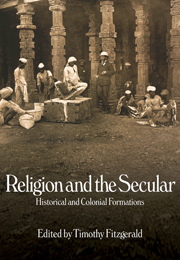Book contents
- Frontmatter
- Dedication
- Contents
- Acknowledgements
- Contributors
- Introduction
- 1 Dialectics of conversion: Las Casas and Maya colonial Congregación
- 2 A higher ground: the secular knowledge of objects of religious devotion
- 3 Secularizing the land: the impact of the Alaskan Native Claims Settlement Act on indigenous understandings of land
- 4 The formative process of State Shinto in relation to the Westernization of Japan: the concept of ‘religion’ and ‘Shinto’
- 5 Religious and secular in the Vietnam War: the emergence of highland ethno-nationalism
- 6 Colonialism all the way down? Religion and the secular in early modern writing on south India
- 7 Understanding politics through performance in colonial and postcolonial India
- 8 Real and imagined: imperial inventions of religion in colonial southern Africa
- 9 Religion in modern Islamic thought and practice
- 10 Rudolf Otto, cultural colonialism and the ‘discovery’ of the holy
- 11 Encompassing Religion, privatized religions and the invention of modern politics
- 12 Colonialism and the myth of religious violence
- Index
8 - Real and imagined: imperial inventions of religion in colonial southern Africa
- Frontmatter
- Dedication
- Contents
- Acknowledgements
- Contributors
- Introduction
- 1 Dialectics of conversion: Las Casas and Maya colonial Congregación
- 2 A higher ground: the secular knowledge of objects of religious devotion
- 3 Secularizing the land: the impact of the Alaskan Native Claims Settlement Act on indigenous understandings of land
- 4 The formative process of State Shinto in relation to the Westernization of Japan: the concept of ‘religion’ and ‘Shinto’
- 5 Religious and secular in the Vietnam War: the emergence of highland ethno-nationalism
- 6 Colonialism all the way down? Religion and the secular in early modern writing on south India
- 7 Understanding politics through performance in colonial and postcolonial India
- 8 Real and imagined: imperial inventions of religion in colonial southern Africa
- 9 Religion in modern Islamic thought and practice
- 10 Rudolf Otto, cultural colonialism and the ‘discovery’ of the holy
- 11 Encompassing Religion, privatized religions and the invention of modern politics
- 12 Colonialism and the myth of religious violence
- Index
Summary
As many analysts have recognized, conventional distinctions between the secular and the religious have often smuggled into cultural studies the ideological division between a modern Western ‘Us’ and a primitive, savage, barbarian or exotic ‘Them’. While the West is supposedly secular, the alien is rendered as essentially religious. In his recent book, Imperial Encounters (2001), Peter van der Veer has neatly formulated this conventional opposition with respect to religion and modernity in nineteenth-century India and Britain. “India is a deeply religious, traditional society, whereas Britain is a deeply secular, modern society” (ibid.: ix). In this dichotomy, the metropolitan centre is secular, modernizing and making history, while the colonized periphery persists in traditional forms of religious life, perhaps since time immemorial, which can only be changed, supposedly for the better, by outside interventions. In the course of colonial history in India, this dichotomy between the secular and the religious has not merely been imposed from the outside but has also been appropriated and mobilized by Indian nationalists as a way of actively engaging the interventions by the West. The West might excel materially, as the Hindu philosopher Sarvapalli Radhakrishnan maintained, but the East excelled spiritually (Scharf 1998: 103).
Like the ‘exotic’ religion of the East, the ‘savage’ religion of Africa has often been represented in terms of this colonial opposition between the modern, secular West and an Africa that is traditional and, in the words of John S. Mbiti, “notoriously religious” (1969: 1).
- Type
- Chapter
- Information
- Religion and the SecularHistorical and Colonial Formations, pp. 153 - 176Publisher: Acumen PublishingPrint publication year: 2007



